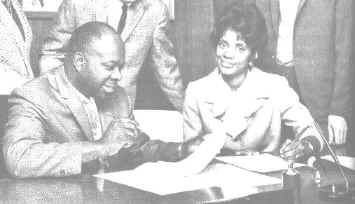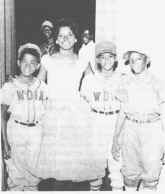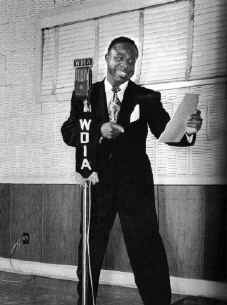
Rufus (father) and Carla Thomas (daughter) were R&B and soul singers from Memphis, Tennessee that recorded for Stax Records in the 60s.
Rufus and Carla Thomas

Rufus (father) and Carla Thomas (daughter) were R&B and soul
singers from Memphis, Tennessee that recorded for Stax Records in
the 60s.

In the glorious decade and a half of sound that was Stax in
the '60s and early '70s, Carla Thomas was the Queen of Memphis
Soul. She was born in Memphis in 1942, and 18 years later she
recorded a duet with her father Rufus Thomas, giving the
fledgling Satellite label its first taste of success with the
regional hit "Cause I Love You." As her 18th birthday
drew nigh, she cut her first solo single, the teen ballad
"Gee Whiz (Look at His Eyes)." Written a few years
earlier and rejected by Vee-Jay in Chicago, it gave Satellite its
first national hit, breaking the Top Ten mark on both the R&B
and pop charts. Shortly thereafter Satellite became Stax, and
Carla proceeded to claw her way onto the national charts another
22 times with such immortal slices of soul as her answer song to
Sam Cooke, "I'll Bring It on Home to You," as well as
"Let Me Be Good to You," "B-A-B-Y,"
"Tramp" (with Otis Redding), and "I Like What
You're Doing to Me." Carla released six solo albums and,
with Otis Redding, one duet album on Stax between 1961 and 1971.
-- Rob Bowman, All-Music Guide

Few of rock & roll's founding figures are as
likable as Rufus Thomas. From the 1940s onward, he has
personified Memphis music; his small but witty cameo role in Jim
Jarmusch's Mystery Train, a film which satirizes and enshrines
the city's role in popular culture, was entirely appropriate. As
a recording artist, he wasn't a major innovator, but he could
always be depended upon for some good, silly, and/or outrageous
fun with his soul dance tunes. He was one of the few rock or soul
stars to reach his commercial and artistic peak in middle age,
and was a crucial mentor to many important Memphis blues, rock,
and soul musicians.
Thomas was already a professional entertainer in the mid-'30s,
when he was a comedian with the Rabbit Foot Minstrels. He
recorded music as early as 1941, but really made his mark on the
Memphis music scene as a deejay on WDIA, one of the few
Black-owned stations of the era. He also ran talent shows on
Memphis' famous Beale Street that helped showcase the emerging
skills of such influential figures as B.B. King, Bobby Bland,
Junior Parker, Ike Turner, and Roscoe Gordon.
Thomas had his first success as a recording artist in 1953 with
"Bear Cat," a funny answer record to Big Mama
Thornton's "Hound Dog." It made number three on the
R&B charts, giving Sun Records its first national hit, though
some of the sweetness went out of the triumph after Sun owner Sam
Phillips lost a lawsuit for plagiarizing the original Jerry
Leiber/Mike Stoller tune. Thomas, strangely, would make only one
other record for Sun, and recorded only sporadically throughout
the rest of the 1950s.
Thomas and his daughter Carla would become the first stars for
the Stax label, for whom they recorded a duet in 1959,
"'Cause I Love You" (when the company was still known
as Satellite). In the '60s, Carla would become one of Stax's
biggest stars. On his own, Rufus wasn't as successful as his
daughter, but issued a steady stream of decent dance/novelty
singles.
These were not deep or emotional statements, or meant to be.
Vaguely prefiguring elements of funk, the accent was on the
stripped-down groove and Rufus' good-time vocals, which didn't
take himself or anything seriously. The biggest by far was
"Walking the Dog," which made the Top Ten in 1963, and
was covered by the Rolling Stones on their first album.
Thomas hit his commercial peak in the early '70s, when "Do
the Funky Chicken," "(Do The) Push and Pull," and
"The Breakdown" all made the R&B Top Five. As the
song titles themselves make clear, funk was now driving his sound
rather than blues or soul. Thomas drew upon his vaudeville
background to put them over onstage with fancy footwork that
displayed remarkable agility for a man well into his 50s. The
collapse of the Stax label in the mid-'70s meant the end of his
career, basically, as it did for many other artists with the
company. -- Richie Unterberger, All-Music Guide
Rufus Thomas died in St. Francis Hospital in Memphis, Tennessee December 15, 2001 of heart failure at the age of 84.
![]()